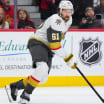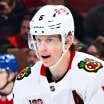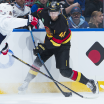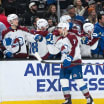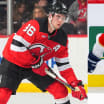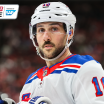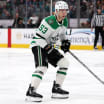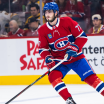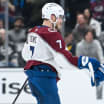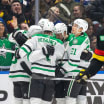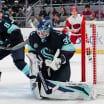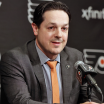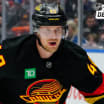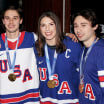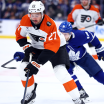In NHL.com's Q&A feature called “Sitting Down with …” we talk to key figures in the game, gaining insight into their lives on and off the ice. This week, we feature Stu Barnes, who played 1,136 NHL games with five teams, reached the Stanley Cup Final twice, and has served as coach of Tri-City in the Western Hockey League the past four seasons.
Barnes talks playing career, coaching at junior level in Q&A with NHL.com
Former forward competed in Stanley Cup Final with Panthers, Sabres, now behind bench in WHL
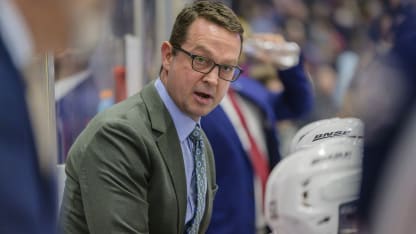
© John Keller
Stu Barnes couldn't help but reflect on his playing days after watching on television former teammate Mario Lemieux read the starting lineup for Team Canada prior to its first game at the 4 Nations Face-Off in Montreal on Feb. 12.
Barnes, a former NHL forward who is now coach of Tri-City in the Western Hockey League, was reminiscing with some of his players at the time.
"I don't think I understood how incredibly talented he was until I got a chance to see him every day, and I think that was pretty special," Barnes told NHL.com. "Being able to play with Mario and see how incredibly talented and what a great person he was is a time I'll never forget. Just to say you've been there, done that, or scored a goal on a pass that he might have made and basically get a tip-in to take it the final inch over the line … he did everything."
While certainly proud of what he was able to accomplish in his 1,136 games as a player with five teams (597 points; 261 goals, 336 assists), Barnes is also grateful for the friendships made and getting the chance to play alongside or against so many greats over 16 NHL seasons.
Barnes shared a locker room with Lemieux, Jaromir Jagr and Ron Francis with the Pittsburgh Penguins (1996-99). He skated with Teemu Selanne, Keith Tkachuk, Eddie Olczyk and Phil Housley during his time with the Winnipeg Jets (1991-93). He was with the Florida Panthers when they first reached the Stanley Cup Final in 1996, served as captain in two of his five seasons under Lindy Ruff with the Buffalo Sabres (1998-2003), and played with Mike Modano, Eric Lindros, and Sergei Zubov among others, in his five seasons with the Dallas Stars (2002-08).
Barnes' associate coach in Tri-City is Jody Hull, who played 831 NHL games over 16 seasons, including three with Barnes in Florida (1994-97).
"What an experience," Barnes said. "I think for any anybody that's played even 10 games in the League knows how difficult it is and how incredibly competitive it is not only team to team, but individual versus individual. Trying to maintain your spot, maintain your production, or whatever your role on a team is tough. Quite honestly, having been around that group in Florida, with guys like Scott Mellanby, Brian Skrudland, Dave Lowry, Tom Fitzgerald, Mike Hough ... these were guys you learn from when you're young.
"I have to give them a lot of credit because you learn from them, try to emulate those guys and the next thing you know, the door's unlocked and there's another jersey waiting for you and you just keep putting it on. I was very lucky."
NHL.com spoke with Barnes, now 54, about his career as a player and coach.
Winnipeg selected you No. 4 in the 1989 NHL Draft. Did you have an idea the team was interested in you at the time of the pick?
"Yes. I made a visit to Winnipeg prior to the draft, so I knew there was a chance. I grew up in Edmonton, so for me to go to Winnipeg was a comfortable transition just because of the similarities of the cities all those years ago. It wasn't like I was going to New York City or Los Angeles, two completely different areas from where I grew up. So, it was a really good spot for me to begin my career."
What sticks out most from your time in Winnipeg?
"I got called up my second year (in 1992-93), and that was the season Teemu went on his goal scoring run. I dressed every night but didn't play a ton of shifts. But I had a front-row seat to watch Teemu score all those goals (76). Keith (Tkachuk) came in the year before (1991-92), so I got to know him. Thomas Steen was there, another tremendous player. I got to play with Randy Carlyle briefly. Eddie (Olczyk) was there. Eddie and I are still good friends. I still chat with him every now and then; he treated me so well while I was there. It's like any other profession -- the relationships you gain with people and organizations are really special. I really enjoyed my time in Winnipeg."
You played for the Panthers when they reached the Cup Final in 1996. How special was that group?
"We were really close, and that was probably the secret to our success. I got traded to Florida (Nov. 25, 1993) so I was coming in a little bit late, but me and my wife got accepted very quickly. Every night, postgame, we would all go for dinner. We all lived within a half mile of each other because everybody was new, so we ended up in the same place. It was a very tight group. A lot of us still keep in contact even today. I'm good friends with a lot of guys on that team. I think we're all proud to be a part of that original bunch, and it was really cool to watch them win the Cup last season. I know that a lot of us were really excited for the franchise and for the area to have that much success. There was a lot of text messages flying around after that win, excited for the team and the area. Billy Lindsay still being there as well, and familiar faces from back in the day."
You went to the Cup Final again as a member of the Sabres in 1999. How do you view that playoff run?
"I mean, it's one of those great memories, but tough memories (after Dallas Stars forward Brett Hull scored in the third overtime of Game 6 to win the best-of-7 series). I think you work so hard to get to that level and to get that close, and then obviously for it to end the way it did was pretty disappointing. That's what everybody talks about, right? It was a fantastic series (four of the six games decided by one goal), and I really felt like we had a good chance if we could have extended it beyond [Game 6], but that's one of those ‘should-haves, could-haves.’"
You served as a captain two seasons in Buffalo (2001-03) and alternate captain two seasons in Dallas (2006-08). How do you view leadership and what do expect of your captains now as a coach?
"I think that evolves over time and from team to team. Probably the most important thing is just trying to set an example by actions you do every day. How you handle yourself, your habits at the rink, away from the rink. I was really lucky to learn from some of the best -- players who made sure that everybody was moving in the right direction."
Who was the most influential coach in your career?
"I would say Roger Neilson (in Florida). I think Roger because when I was traded from Winnipeg to Florida, it was at a time when people were asking, 'Is this guy going to continue to be a player or not?' I think Roger really gave me a lot of confidence and great perspective about the game, so I was able to learn a lot from him. I'd also say Lindy Ruff (in Buffalo). I feel those two are probably the guys who really helped me understand the game at that level, and I was able to have success as a result."
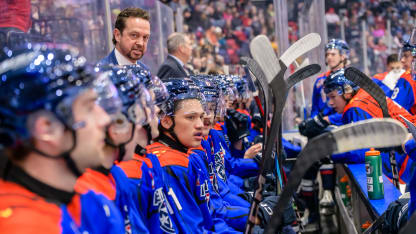
© John Keller
What do you enjoy most about coaching?
"I think when you see players or individuals on or off the ice continue to grow and have some success and you feel like, 'Hey, I've been able to contribute to that and help them grow, get better and improve.' That's what I enjoy most."
What can you tell us about Tri-City defenseman Jackson Smith, who is No. 9 on NHL Central Scouting's midterm ranking of North American skaters, and a projected top-20 pick in the 2025 NHL Draft?
"He's big (6-foot-3, 195 pounds) and he's a very good skater, really good on his edges. He has the ability to transport the puck down the ice and skate it out of trouble in his own zone and then get it down the ice into the offensive zone. I think he's a better defensive player than he probably gets credit for, so it's a combination of all those attributes."
What did you think of the 4 Nations Face-Off?
"It was fantastic. I think you certainly saw the passion in all the games and especially in the United States-Canada games. I think it was a great showcase for hockey. I mean, over here at Tri-City in Washington State, we're not necessarily in a traditional hockey market and there was still a lot of buzz and a lot of talk about it, which was exciting. I think we all know how great our game is, and I think to get it out and to have people that maybe aren't huge fans, or maybe you're just casually watching the game, be able to see the passion and the ability of these guys nowadays is incredible. I thought it was an excellent event."
